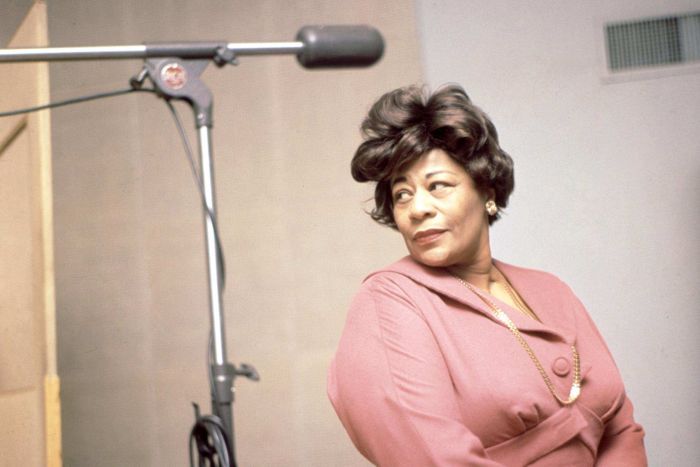by Marilyn Lester
Is there a better way to celebrate the 100th birthday of the immortal Ella Fitzgerald than by opening with “Portrait of Ella Fitzgerald” by jazz giants Duke Ellington and Billy Strayhorn? In its rousing first movement, “Royal Ancestry,” the Jazz at Lincoln Center Orchestra (JALCO) set the tone for a swinging, thrilling, toe-tapping evening of music made famous by The First Lady of Song. Big guns of jazz, tenor saxophonist Joe Lovano, and vocalists Kenny Washington and Roberta Gambarini were added to the mix to royally celebrate Fitzgerald’s life and legacy.
The “blue” note of the evening was the absence of JALCO’s leader, trumpeter Wynton Marsalis, who was called away by a family emergency. His chair was ably filled by Bruce Harris, with reed player Victor Goines, alto sax man Sherman Irby and trombonist Vincent Gardner sharing Musical Director duties. One of the assets of the JALCO is its egalitarian nature, with all members encouraged to arrange as well as play, take solo turns, and be generally proactive. The result is a disciplined, tight sound with a remarkably blended feel within the precision. Yielding the spotlight mostly to vocals in this concert, JALCO concentrated on “Portrait…,” bookending the two acts with the four movements of the composition. “All Heart,” “Beyond Category,” and finally, “Total Jazz,” completed the Ellington-Strayhorn musical ode to the Queen of Jazz.
Taking solos with the JALCO and with Washington and Gambarini, Lovano easily demonstrated why he’s one of the premiere tenor sax players of the modern age. He’s known for his ability to improvise, having synthesized several modes of jazz playing into his own unique style. Yet, on a jazz version of the traditional “Old MacDonald,” he seemed to be channelling Sonny Rollins with bop-like speed as Gambarini scatted with a creative eloquence and power that nearly approached Fitzgerald’s own superhuman abilities. The two also demonstrated their talent for power-swing and scat with a zooming “Lover Come Back to Me” (Sigmund Romberg & Oscar Hammerstein II).
The Italian-born Gambarini has an innate feel for jazz. She’s a natural swinger and a master scatter with a seductive, mellow voice. Her energy and liveliness is charismatic, especially when she lets loose with unrestrained creative phrasing. But a torch singer Gambarini is not. Her rendition of Billy Strayhorn’s “Lush Life” was far too showy. Strayhorn was protective and particular about this work. He envisioned it performed in a specific way, as a slow, torchy jazz-blues. Gambarini’s interpretation to Victor Goines’ dramatic arrangement was simply too over-the-top, with only hints at the subtlety and depth that was Strayhorn’s intent. The piano, introduction by Dan Nimmer, was, however, noteworthy, as was James Chirillo’s guitar intro to Gambarini’s fine delivery of Ray Noble’s “I Hadn’t Anyone Till You.”
Also brilliant at scatting, Kenny Washington is a straight-ahead and very laid-back vocalist with a four-octave range. His confidence reflects the ease with which he glides through any number of styles and genres. He playfully attacked Marcus Printup’s slow dance arrangement of “Bewitched, Bothered and Bewildered” (Richard Rodgers and Lorenz Hart), and with Kenny Rampton’s pop-style arrangement of “I’m Old Fashioned” (Jerome Kern and Johnny Mercer) inserted an energetic segment of Fitzgerald-style scat. Washington was joined by Lovano for a grooving interpretation of “Too Close for Comfort” (George David Weiss, Jerry Bock and Larry Hofocener), arranged by Carlos Henriquez.
Several duets spotlighted the delightful chemistry between the tall Gambarini and the diminutive Washington. The two clearly have a grand respect for each other, as well as a playful approach to the serious work of singing great music. Their delivery of the Sherman Irby-arranged “Almost Like Being in Love” (Alan J. Lerner and Frederick Loewe) and George and Ira Gershwin’s “They Can’t Take That Away From Me” was dynamic and joyful. A highlight of the evening was an ultra-swing rendition of Duke Ellington’s “Cottontail” with all performers on board. Fitzgerald scatted to the tune when she recorded Sings the Duke Ellington Songbook in 1957, since the Jon Hendricks vocalese lyrics hadn’t yet been written. In emulation, Washington and Gambarini scatted at super speed, while the musicians powered a sound that brought to mind a crew of wildly hopping bunnies. A crowning moment of the band’s performance of “Cottontail” was an electrifying call-and-response segment between Lovano and Walter Blanding. Ella Fitzgerald, born on April 25, 1917 died in 1996, but remains an immortal presence in the world of music and entertainment. She was truly, as Ellington said of her, “beyond category.”
Celebrating Ella: The First Lady of Jazz, April 27 and 28 at 8 pm
Jazz at Lincoln Center, Broadway at 60th Street, 212-721-6500, www.jazz.org




















